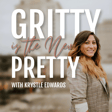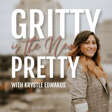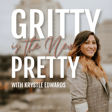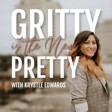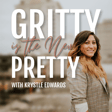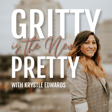Become a Creator today!Start creating today - Share your story with the world!
Start for free
00:00:00
00:00:01

9: Sharon Chambers-Gordon, CEO & Founder of Raising Girls
Grit and Grind podcast is brought to you by Grit City Women - A female forward organization that nurtures a creative approach to empowering female entrepreneurs, small business owners, and leaders in Tacoma. Join host Krystle Edwards and Sharon Chambers-Gordon, Founder and CEO of Raising Girls. Raising Girls provides necessary hygiene products to girls in the South Sound to eliminate humiliation, promote pride, and share love with thousands of girls in our community.
1. Raising Girls Organization 2. Period Education for Male teachers 3. Period Poverty in the US 4. Ending Period Poverty 5. How COVID-19 has affected access to hygiene products
Learn more about Sharon and Raising Girls:
1. Raising Girls Organization 2. Period Education for Male teachers 3. Period Poverty in the US 4. Ending Period Poverty 5. How COVID-19 has affected access to hygiene products
Learn more about Sharon and Raising Girls:
- Website https://www.raisinggirls.org
- Insta : raisinggirlsorg
Transcript
Introduction to Grit and Grind Podcast
00:00:03
Speaker
Welcome to Grit and Grind, a podcast by Grit City Women, where gritty is the new pretty. Grit City Women is empowered by Melissa Newell, Edward Jones Financial Advisor, and Columbia Bank.
Featuring Sharon Chambers Gordon and Raising Girls
00:00:15
Speaker
On episode nine of Grit and Grind, we are pleased to feature Sharon Chambers Gordon, CEO and founder of Raising Girls, a nonprofit organization right here in Tacoma. Welcome, Sharon.
00:00:31
Speaker
Thank you, Crystal. I'm delighted to be here. I'm excited to have you. Why don't you go ahead and start with just telling us a little bit about yourself. So I am from Jamaica, the beautiful country, and reminds me here of the Pacific Northwest with the mountains and the sea. I work as a full-time realtor with Windermere Professional Partners, and I am the founder and CEO of Raisin Girls, where we provide hygiene products to girls here in the South Sound.
00:01:00
Speaker
That's amazing. Tell us more about Raising Girls.
Inception and Inspiration of Raising Girls
00:01:05
Speaker
Raising Girls was launched as an official 501c3 organization in 2017, but I've been doing nonprofit work for over 30 years. Started back in Jamaica with my mom, Mary, who was a community organizer. I watched her.
00:01:23
Speaker
packed care bags with neighbors. She was an excellent chef, so she sent food and I wanted to emulate her and really give back to my community. So over the years, wherever I have lived, I have formed community and to make sure that I find especially girls that I could give back to. And so Raising Girls was launched officially in 2017 because we had lots of requests for hygiene products and we felt that we needed to get
00:01:50
Speaker
official to be able to write grants, raise funds so we can serve as many girls as we can. Wow. How did you recognize that there was a need?
00:02:01
Speaker
My wonderful daughter Amara was at Truman Middle School and she came home one afternoon and she says, mom, today was so sad. And I asked her why and she said, because there were girls that nobody wanted to play with at recess. And I said, you know why? And she said, mom, because they didn't smell good.
00:02:23
Speaker
And it immediately triggered in me the fact that we needed to do something and do something right away. Because then I realized that those were the girls who didn't have access to care products. And years before, my daughter and I around this holiday season have done hygiene drives for different little groups. And so we were used to doing that and used to giving back. But that really launched me into thinking we need to do something to help
00:02:49
Speaker
these girls feel good about themselves and to have their surface themes elevated. That's so amazing. It gives me goosebumps. How do you get the hygiene products to them?
Partnerships and Distribution Strategy
00:03:08
Speaker
When I initially started, I sat down and figured out how we could get access to girls. And what made sense to me were the organizations that already had the girls in them, which were the school districts.
00:03:24
Speaker
boys and girls clubs and organizations like the Tacoma Urban League. So I contacted a superintendent from Tacoma School District and told her about my vision to help to provide hygiene products for girls. And the first thing she said was, Sharon, there is no one else in the community who is doing this.
00:03:42
Speaker
Then I contacted Carrie Holden from the Poison Girls Club, and interestingly enough, she said the very same thing. There is no organization that is focusing on hygiene products. Some organizations are focusing on food and school supplies, but no one is focusing on hygiene products, and they were very excited to have this partnership with us. What kind of hygiene products do you deliver? Our hashtag is respect for every girl.
00:04:12
Speaker
I wanted it to be that because we wanted to make sure that we were donating to the girls packing the bags with full size products. Everyone knows about the little bottles of stuff that you get complimentary from different places. So I wanted to make sure that those were just just supplemental in the bag. So we have 10 base items in our bags, which are shampoo conditioner.
00:04:37
Speaker
lotion, deodorant, wash rag, body wash, tampon and pads. And then we had the other items that we would just put as something extras in the bags for the girls. So they could have a bag supplies them for eight weeks and then we replenish. The story behind it inspired you to get this going. What inspires you to continue to do this work
00:05:07
Speaker
because there's so many girls who have need, so many girls who have been left behind. They don't have access to much. And then the challenges of when you have, especially your period, or you don't smell good at school, you are shunned. And we wanted to make sure that all of these girls were not going to be left behind. And I got a call from a middle school principal
00:05:36
Speaker
who expressed great concern that there were girls in middle school who were missing school three or four days per month. And then they found out that is because when they started their periods, their family didn't have access to hygiene products. So she said, we never understood why there was so much toilet paper missing from the bathrooms until we realized that girls were reeling the paper off, taking it home, using that overnight, and then they had nothing the next day. So they didn't come back.
00:06:05
Speaker
And we have heard that socks are the new pads. And that made me very, very sad.
00:06:12
Speaker
to figure that girls had to be using. They use cardboard, they use paper, you know, and the challenges are the medical and physical issues that come with that. Urinary tract infections, reproductive health issues, all of those are tied back to unsanitary conditions for girls who don't have access to the proper products to take care of themselves.
00:06:37
Speaker
So what you're doing, you know, it's not only good for their self-esteem and their ability to socialize, but it's also for their health. I mean, it's incredibly important. I remember when I was in high school, you know, it,
00:06:52
Speaker
people didn't really talk about periods and it's always obviously a really kind of inconvenience for women and sometimes it can be very painful and you almost can't do anything if you have a heavy flow.
00:07:07
Speaker
And I remember, and this was actually in my health class, which is kind of ironic. One of the students, she sat next to me and she had started her period and bled through her pants. And she was like, Oh my God, I don't know what to do. And I said, well, you know, wrap your sweatshirt around your waist, go talk to the teacher, go to the bathroom. You know, she went and asked the teacher, Hey,
00:07:34
Speaker
can I go to the restroom? And he said no. And because he thought she was trying to just get out of class and she like sat back down and she was, you know, so uncomfortable. She didn't know what to do. And I went up to him and I said, hey, like you need to let her go to the bathroom. And he refused. And then he like was like, why do you need to go? Why do you need to go? He totally put her on the spot.
00:08:01
Speaker
And until finally she was like, oh, I sat in red ink.
00:08:05
Speaker
and it was just so humiliating for her. And he just didn't even, I don't even think he thought about it. Do you know what I mean? Yes, of course. I've had conversations with several male teachers and asked them the question, do you know why you see girls walking around school with a top or a sweater tied around their waist? And they look at me blankly and I said, because they have started their periods, they've saw themselves and they are staying in school, but that is what they're hiding.
00:08:35
Speaker
Each of them have always said, we don't even think about that raising girls. We have been working on a teacher resource and one of them is to explain to teachers, especially male teachers, why it is important that when a girl raises her hand to go to the bathroom, that they let them go.
Education and Adaptation in Schools
00:08:56
Speaker
And it's because some schools have a rule that after recess,
00:09:01
Speaker
You cannot go to the bathroom within 20 minutes of being back in class. And I learned that from my daughter when she was in middle school. And so they're hard and fast. You know, people, they don't bend the rules. And so this is what we have with the girls being embarrassed. So we are. In fact, we just sent it to the printers.
00:09:19
Speaker
the teacher resource that we're going to send out electronically and know that COVID-19 is taking place and to have hard copies at the schools to really educate teachers around these health issues for girls and the challenges they face just sitting in a classroom and being embarrassed by this.
00:09:37
Speaker
That's incredible, you know, and it's for me I've had some issues, you know with my reproductive health and talk about it a couple episodes ago with dr. Winner Yes, but I also work in at that time an industrial environment and so for me I
00:09:56
Speaker
When I would get my cycle, I was often very far away from the restroom. It was very stressful for me. Every time it was coming around, if I would have to go do something where I was far away, that was everything on my mind. Thank goodness for the Thinks underwear and the NYX underwear because those are a lifesaver when you have a really heavy flow.
00:10:19
Speaker
Um, but people don't think about that, especially if you're in a male dominated world or a male dominated industry. Um, even cramps, you know, how sick they make you like, Oh man, it definitely, you know, I just feel like we should get paid time off for that because I can't help it and I can't do anything. Right. And it is, you know, it is the whole issue that
00:10:47
Speaker
Because it is not a subject that is talked about regularly, normal conversations, it always seems to be in a hush-hush environment that we have not had the opportunity to talk about these things and really interact in a way that
00:11:03
Speaker
is informed and really relatable to teachers or even workers in a workplace and all that because it period has become so harsh. It has been over the years such a harsh issue that girls are not taught to speak up and teachers are not prepared to deal with the issue head on to support girls.
00:11:29
Speaker
Well, when you get those resources, I would love to help distribute those through Grit City Women or get the word out, however I can support. So send those my way for sure. Certainly will. So how have you been adapting since COVID-19 hit with Raising Girls? We have been so busy.
00:11:50
Speaker
or here so far, once the governor issued stay at home orders, I immediately thought of the girls who would not have access to these care bills because they're delivered to the schools. So immediately my leadership team and I, we had an emergency meeting and met and made a plan
00:12:08
Speaker
that we were going to make sure that the schools got bags and that what the ones that were left there already delivered were going to go home with the students. And then we put on social media for different places where bags were located. We met families in parks. My office at Windermere gave me space for a whole week and we send the word out.
00:12:28
Speaker
so that people could come to pick up bags. And then after the stay-at-home orders were issued and we were really staying home, then my team of volunteers came to our packing center, picked up bags and took it to do porch drops. So we have delivered since March over 3,000 care bags of hygiene products. How do the students or the girls get in touch with you to let you know that they need support?
00:12:55
Speaker
So we communicate through the school counselors and nurses and principals. So we are in touch with all of those three sets of people from the various schools. So we have liaisons from our leadership team. And so one person will call their middle school and talk to the principal and the counselor to say,
00:13:14
Speaker
We have bags available. Can you let us know how many bags we should drop off? And then the families are communicating with the schools and the schools know of the families who have high need. And so we've been able to make it a real smooth oil machine to make sure that the schools get the supplies and then the families are able to pick them up. A lot of them are picking them up when they pick up lunches, you know, during the daytime.
00:13:41
Speaker
and then some of them coming individually to get bags from the schools, with the boys and the club as well. Having a process and in place where we talk to the principals, the school counselors, the nurses, they communicate with the families and then they will let us know how many bags are needed and then the families are able to either come to school and pick them up or they get them when they come to pick up lunches at the school site.
00:14:10
Speaker
So how many volunteers do you currently have? We have a core team of 19 women total on our leadership team. And then we break down into into committees. So we have a community outreach committee, we have grant writing, we have marketing, we have social media. And so we each are doing
00:14:30
Speaker
the various pockets of work. And then when there is need to come and do a packing party or to do a big delivery, all of us are on board. Along with our leadership team, we have volunteers who are faithful. They come often. They come to stock shelves, pack bags, do inventory, write inspirational cards, deliver to homes. And so we have been so very fortunate to have the community support behind us.
00:15:00
Speaker
that we have not missed a beat this year. I'm amazed by that. I know, you know, I run Liz Rocks. It's a non-profit that provides outdoor opportunities for students. And it's been really hard building that connection because a lot of these students who don't have these opportunities, you know, they really need someone on their side to introduce them and to advocate for them to get outside.
00:15:29
Speaker
So that's definitely something that we've been trying to navigate is how do we connect with these students and let them know these opportunities are available. So, you know, you've definitely cracked the code and it sounds like you have an incredible support team. Yes, we do. We really do. And the work doesn't happen without them. So I'm, you know, eternally grateful to everyone pitching in and helping as many families as we have been able to.
00:15:53
Speaker
That's amazing. I love it. I'm so into it. So what kind of stuff do you have planned for 2021?
Future Plans and Expansion
00:16:02
Speaker
We have 2021 Raising Girls Leadership Team retreat on January 9. And so we have started to plan for what we're going to be doing. One of the big things that we're going to be doing for 2021 is to launch or adopt a school program.
00:16:19
Speaker
What we are finding is that the need is so great in so many communities. It's not just Tacoma, UP, Steilacombe, Franklin Pierce. It is in Bonney Lake and Sumner. So we are going to launch an adopted school program where we are going to find community members who are interested in working with us. And my daughter came up with the slogan, We Pack, You Deliver.
00:16:42
Speaker
We're going to have bags available. We're going to connect these willing volunteers with principals and school counselors in each school. And then with the school that is closest to you, you can help us to distribute the bag. That way we are going to expand or reach exponentially to help
00:17:02
Speaker
thousands more girls. And so I'm very excited about that. It's going to take a concerted effort and a lot of our time to get it organized, but we are prepared for it. We were going to launch it this year, but then COVID-19 came. So we are putting it off and then launching it in 2021 or adopt a school program.
00:17:19
Speaker
And then we are partnering with other organizations to just expand our reach and to continue to do our intentional fundraising because the more money we have, the more girls and families we are able to support. What kind of organizations do you typically partner with?
00:17:38
Speaker
We partner with the school districts, as I said earlier, Boys and Girls Club, Tacoma Urban League, and then we have partners who have joined us like the Southson 100 Women who have supported us this year with a 10,000 grant, and then they packed 100 care bags and dropped it off to our packing center.
00:17:57
Speaker
Greater Tacoma Community Foundation. We got a Pierce County Connected Fund from them of $20,000. We were the recipients of the BECU People Helping People Award in 2019, December, where we won the biggest award, which was $50,000, and they had extras. So we got $54,400, and BECU is a continued partner. And this fall, we were selected as one of nine nonprofit organizations.
00:18:26
Speaker
that they were going to do their day of service employee packing and support us. So we got from them 4,000 care pouches of hygiene products that we are focusing on to support our homeless communities as well. And then Lola Hygiene, they donated 500 boxes of pads to us and say they're willing to give us more. The Junior League of Women,
00:18:52
Speaker
they did a packing party outdoors and packed care bags and dropped it off to us. We are now a part of the Alliance for Period Supplies and that organization will help us with advocacy campaigns and initiate period supply drives with us. And so we got our charter certificate from them that we are part of the national organization. Now we really work hard for that and we got that designation.
00:19:19
Speaker
And then we have Bamford Foundation. They gave us $5,000 last year. This year, they doubled it to $10,000. Delta Sigma Sorority, they came and volunteered and passed and brought supplies for us. And then in Light Candy Company, we met chief funders through Instagram, and she said she was going to give us 40% of her summer sales.
00:19:41
Speaker
from her candles, which she did send us a big fact check of $550 for that. And then in the fall, we got a multi-care grant of $5,000. And then our amazing community, they do porch drops, they send funds. And so it has really expanded into an organization that the community has wrapped itself around in support for us to help all of these girls that we are helping.
00:20:08
Speaker
That was just incredible to listen to it when your accomplishments with this organization are incredible. And maybe you should definitely be very proud of the work that you're doing and what you've accomplished. It's just, it's amazing. And there's such a need. And I find it so interesting as you know, we talk about periods in a lot of third world countries and how girls can't go to school, but we don't really realize it's happening here.
00:20:34
Speaker
Yes, and that is one of the huge issues that have come to the fore with raising girls, or hashtag another one, end period poverty. And we have really been intentional about talking about periods and bringing up that word, because I've met so many people in the community who said, we had no idea this was here. Not in our backyards, but in our front yards, in our schools, that there's so many girls who lack
00:21:02
Speaker
the necessary products that they need to take care of themselves. And so people who have been from different churches and different organizations who have been packing boxes and sending care packages abroad have also now been supporting raising girls because they said, we now know of the need and know we want to help locally as well. So what kind of role does your daughter play in all of this?
00:21:30
Speaker
We were on city line last weekend and that question was asked, Amara, what do you do with raising girls? So, of course, you know, she's my daughter and has been in the trenches with me throughout the years, done our own little toiletries drive around the holiday period, as I mentioned before.
00:21:45
Speaker
And then she's our social media manager and web manager. So she, all our social media, she does and manages our webpage content. And of course my right hand and my left hand, every kind, every design of things that I need, every postcard, everything, our logo, she is the one who does it for us and really, really appreciate her.
00:22:06
Speaker
Coming alongside me and in honor of my mother Mary who raised me I raised my daughter Amara and so that's the way the name came from raising girls What an incredible journey for you to to go on together Yes, it's been awesome. How old is she? 23 Wow
00:22:31
Speaker
And is she planning on sticking around and staying engaged? Yeah, she just bought her first home. Oh my God, really? Yes, she worked at Microsoft, just bought her first home. In fact, we are moving her this weekend into her brand new house. So I'm very proud of her.
00:22:48
Speaker
Oh my God, that's so amazing. That's really incredible. Buying a new home and starting your life. It's so fun. I'm really excited for her and excited for you. Thank you. And one of these days you will definitely get a chance to meet. I hope so. I'm super excited just to learn more and to see where this goes. Absolutely.
00:23:12
Speaker
And you know what I'm thinking that, you know, there could be some good connections, you know, with some of the physicians that I worked with, with some of my issues, just to help spread awareness about this stuff. That would be amazing. And, you know, our
00:23:27
Speaker
wonderful leadership team members who are doing community outreach all the time. They're helping us to spread the word and to really make sure that people understand that we're here to help them and to get that educational piece. So I have lots of them on social media.
00:23:44
Speaker
especially Instagram, just kind of sharing about us and spreading the word. So now people are hearing about us and contacting us from various organizations. I have a list here of 46 organizations and schools that we have supported since March.
00:24:03
Speaker
And we are now focusing on the homeless populations. As I said, we got those care pouches from BECU. And then we got a call from Habitat for Humanity and through some local connections, they said they had three pallets.
00:24:19
Speaker
of small size hygiene products and someone recommended that they donate them to us. So they dropped off with their big truck, three pallets of hygiene products, shampoo and conditioner and bar soap. And so we are incorporating those in those nice pouches that we got from BECU. It's just a perfect partnership. And then since we did that in October, we have
00:24:44
Speaker
had connections with these homeless population organizations. Love Connection Tacoma, Nohinted La Resistanceia, Helping the Homeless of Tacoma, Food Not Bombs Tacoma, Downtown Emergency Services Center, The Oasis, Coffee Oasis in Pierce County, Comprehensive Life Resources at Beacon Center, Silicon Food Bank, CMR Homeless Outreach, and 120 homeless students identified at Lincoln High School.
00:25:13
Speaker
I'm just blown away. That's incredible. There's such a need. Such a huge need. And we are honored and grateful to be able to serve, especially in these challenging times of COVID-19 when our health is needed more than ever. Yeah. Do you have any plans to expand nationally?
00:25:36
Speaker
Yes, we do. You know, we want to start statewide and get down to Olympia to really talk about this issue that is really near and dear to our hearts, but also needs to be in the public eye and highlighted in the social networks of government and for them to be involved in the work that we are doing.
00:25:59
Speaker
And so want to launch it statewide for sure. And I have, one of our leadership team members is moving to Washington DC and she's going to launch a Raising Girls chapter there. And I've been talking to another person in Illinois who wants to launch a Raising Girls chapter there. So little by little, you know, we are getting the word out and people are wanting to come alongside us to replicate what we are doing and to help as many girls as they can.
00:26:25
Speaker
Oh, absolutely. I lived in Portland for four years and I know at the high school that I did some work with that they could absolutely use a program like that. So I hope that it picks up and continues to support girls throughout the country and maybe even in the world. Indeed.
00:26:46
Speaker
And so, you know, the numbers are staggering. The 2018 census identified 7,970 girls between the ages of seven and 17 as having high need. And that was 2018 census. And that is in Pierce County, not King County, nowhere else, just in the South Sound. So you double, triple, quadruple those numbers
00:27:11
Speaker
and understand how many girls in the United States, in Washington State, in King County, in Pierce County need our help. So is it mostly just, you know, socioeconomics that status that is affecting their ability to get hygiene or are there other factors?
How to Support Raising Girls
00:27:31
Speaker
You know, there are all kinds of challenges. And this year has really highlighted the disparities that are there. Socioeconomics are definitely
00:27:40
Speaker
but access too, right? Because you can be poor, but know about where you can get help. But having access and information is, that's what we're trying to do to let people know that there is help and, and, and link people with the various services that are, that are around in the communities for different things that they need. So certainly educating the community is one thing that we are definitely trying to do as well.
00:28:06
Speaker
Well, how can listeners that might be listening to this podcast get involved or help out Raising Girls? Thank you for that question. So this holiday season, I know lots of people are shopping, and I'm going to use their name in Amazon. And so you can go to Amazon non-smile, and you can find at the local charity Raising Girls. And if you choose us, then we get a percentage of the sales that you make, so that can really impact our income.
00:28:35
Speaker
This season, you can connect with us on Facebook. You can donate from our website. You can write inspirational cards for us. That will be a huge gift to us this year. If you can write inspirational cards because we put an inspirational message in each of our care bags so that it can uplift the spirits of the girls and their self-esteem. And of course, we're going to launch our adaptive school program.
00:29:00
Speaker
in 2021 and ask that you join us to support us that way. Visit our website, like us on Facebook, follow us on Instagram. That helps to get the word out as well. Awesome. So people can do their holiday shopping and help out without having to, you know, leave their homes and still be safe and isolated from COVID-19. Yes.
00:29:24
Speaker
Great. Well, I'm really excited to have you on and I hope that we can help spread the word through Grit City Women. And it was an absolute pleasure. You were totally a powerhouse. So I will definitely be following you and continuing to stay in touch and see where Raising Girls goes and hopefully be able to support in some way. So you have Instagram and Facebook and your Instagram is Raising Girls.
00:29:52
Speaker
Yes. At Raising Girls. Same thing on Facebook. And then our website is easy. www.raisinggirls.org. Great. Well, it was an absolute pleasure to have you on. I thank you so much for having me on. I'm delighted to meet you this way and for you to help us spread the word about Raising Girls in our community. Absolutely. My pleasure. All right. Happy holidays to you.
00:30:22
Speaker
To learn more about Grit City Women, visit gritcitywomen.com or follow us on Instagram at gritcitywomen, and we look forward to getting gritty with you.
